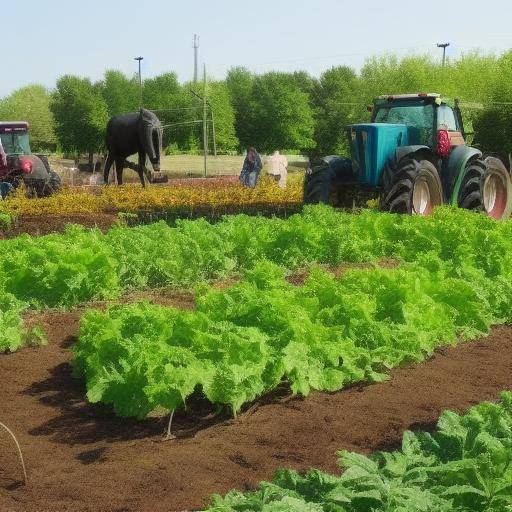
Detroit, known for its rich automotive history, is also a crucible of innovation in urban agriculture. In the midst of the revitalization of the city, vertical farm projects, community orchards and local markets are transforming the way urban inhabitants interact with agriculture. In this article, we will explore five projects that are changing the face of Detroit, providing freshness, sustainability and community to its residents.
Vertical Farms in the Urban Heart
Vertical farms are emerging as an agricultural revolution in Detroit. These innovative facilities use cutting-edge technology to grow food in vertical spaces, optimizing soil use and reducing ecological footprint. Companies like "Vertical Harvest" and "AeroFarms" are leading the way in this trend.
Benefits and Challenges of Vertical Farms
Vertical farms offer a number of advantages, such as local production of fresh food throughout the year, which reduces dependence on the import of agricultural products. However, challenges in terms of initial investment and technical requirements may present obstacles to their large-scale implementation.
Community Orders: Spaces of Collectiveness and Sustainable Growth
Community orchards have flourished in Detroit, gathering neighbors around the earth and promoting local food security. Projects like "Keep Growing Detroit" and "Earthworks Urban Farm" are leading the load, empowering the community through agriculture.
The Social and Environmental Impact of Community Huertos
These spaces not only provide fresh food, they also promote the mental and physical health of the participants, promote social cohesion and contribute to the resilience of the city against economic and environmental challenges.
Local Markets: A Detroit Agricultural Diversity Escape
Local markets play a crucial role in promoting local and sustainable agricultural products. The Eastern Market is a clear example of how these spaces transform the local economy and connect producers directly with consumers.
Promoting the Connection between Producers and Consumers
Local markets not only offer a wide range of fresh products, they also serve as platforms to educate the community on the importance of supporting local and sustainable agriculture.
Comparison of Approaches and Synergies
Vertical farms, community gardens and local markets represent different approaches to urban agriculture. While vertical farms seek to maximize production in small spaces, community gardens prioritize inclusion and education, and local markets serve as convergence points between local production and consumption.
Practical Tips and Actions You Can Take
You want to get involved in the urban agriculture revolution in Detroit? Here are some actions you can take:
- Join a community garden as a volunteer or participant.
- It supports local markets by purchasing local farmers' products.
- Research and support vertical farm projects in your area.
Final Reflections and predictions for the Future
The positive impact of urban agriculture in Detroit is undeniable. As these projects continue to develop, we are likely to see an increase in the availability of fresh food, a greater awareness of sustainability and a strengthening of the community.
As the agricultural horizon of Detroit is transformed, urban agriculture presents exciting opportunities for sustainable growth and community revitalization. These projects are redefining the relationship between the city and the earth, forging a brighter and greener future for Detroit and its inhabitants.
Frequently Asked Questions about Urban Agriculture in Detroit
How can I participate in a community garden in Detroit?
You can participate in a community garden in Detroit by joining as a volunteer or even renting a plot if you are interested in cultivating your own food. Many community gardens also offer educational programs and events for the community.
What are the benefits of buying in a local market in Detroit?
Buying in a local market in Detroit contributes to the local economy, supports farmers in the area, promotes sustainability and provides access to high-quality and fresh products.
How can vertical farms be implemented in densely populated urban spaces?
Vertical farms are implemented in densely populated urban spaces through the use of vertical farming technologies, such as hydropony or aeropony. These technologies allow to cultivate a lot of food in a limited space, taking advantage of the height to optimize production.
What are the challenges facing community gardens in an urban environment like Detroit?
Some challenges facing community gardens in urban environments include land security, funding, community participation and water management. However, with adequate support, these challenges can be overcome successfully.
What role do sustainable technologies play in the development of urban agriculture in Detroit?
Sustainable technologies, such as vertical agriculture, sustainable heating and water recycling, play a crucial role in urban agriculture development in Detroit by enabling efficient food production in limited urban environments.
What is the impact of urban agriculture on community health in Detroit?
Urban agriculture has a positive impact on community health in Detroit by providing access to fresh food, promoting physical activity and fostering connection with nature, which contributes to the overall well-being of urban residents.
With this information, you are equipped to explore the exciting world of urban agriculture in Detroit and its many benefits for the community, the environment and the local economy.
Note: This article offers an overview of urban agriculture in Detroit and does not intend to be exhaustive. An additional research is recommended for specific information on particular projects and opportunities for community participation.
